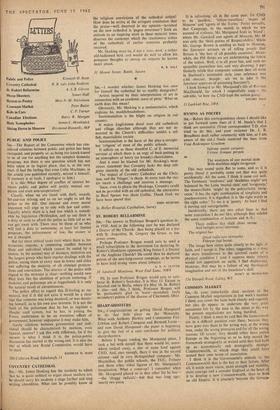HYMNS AS POETRY
Sts,—Before this correspondence closes I should like to put forward some lines of J. M. Neale's that I think are successful. (Your correspondent T.D. also tried to do this, and your reviewer Dr. J. B.
Broadbent dealt rather summarily with him, so I am
aware of the risk.) Neale rendered the lines from
Veni Redemptor Gentium 1 nfirma nostri corporis V irtute firmans per pen as The weakness of our mortal state With deathless might invigorate.
This may sound quite flat to some, and as it is pretty literal it probably came out that way quite accidentally. All the same, I think it came out well. The Germanic 'weakness' and 'deathless might' are balanced by the Latin 'mortal state' and 'invigorate,' the monosyllabic 'might' by the polysyllabic 'invig- orate.' It has the right combination of simplicity and ponderousness. It is dignified. It is 'the right words in the right order.' To me it is 'poetry.' At least I find it moving and unforgettable.
Incidentally, there are two other lines in that
same translation I do not like, although they exhibit
the same combination of latinism and A.-S.: There endless day shall shine serene And twilight never intervene.
The original has Quod walla nox interpolet Fideque jugi luceat.
The image here refers quite clearly to the light of faith, and 1 accept it. The other, suggesting as it does the mere transference to the spiritual realm of a physical condition I (and I suppose many others) would not appreciate on earth, I find displeasing. However, that may be a failure of my theological imagination and not of the translator's skill.
NANCY M. NICHOI soN 15a Disraeli Road, Ealing, W5


































 Previous page
Previous page